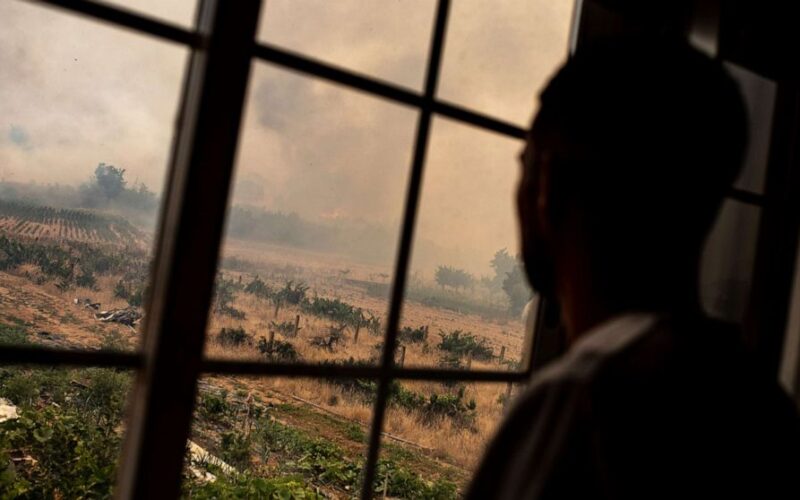Record-breaking heat waves in the US and Europe prove climate change is already here, experts say: As the repercussions of climate change continue to appear in catastrophic weather events of all kinds, hundreds of millions of people worldwide are currently facing searing, hazardous heat.
On Wednesday, the bulk of the continental U.S. is still covered by a searing airmass, with a heat dome over the Southwest and Great Plains and triple-digit temperatures extending into the Midwest and all the way up the East Coast.
There were wildfires across the continent, and more than 1,500 people died from heat-related causes in Spain and Portugal alone on Wednesday, despite the continent receiving a small respite from its own block of sweltering weather that contributed to London reaching its highest temperature ever recorded.
These simultaneous heat waves that are occurring in places thousands of kilometers apart are evidence that the forecasts made by climate scientists decades ago about what would happen to the earth if the temperatures continued to climb, experts told ABC News.
According to Jennifer Francis, senior scientist at the Woodwell Climate Research Center, the increase in heat wave strength, frequency, length, and size is the “most direct” links between weather and climate change.
According to Jason Smerdon, a climate scientist at the Lamont-Doherty Earth Observatory of the Columbia Climate School in New York, extreme heat is a “basic consequence of climate change,” and the fact that it’s occurring simultaneously in several different places is indicative of rising average global temperatures.
A break in low airmass off the Atlantic Ocean moved east and blanketed Spain and Portugal, which is why those countries experienced the worst of the prolonged heat, according to Smerdon. “While each heat wave itself is different, and has individual dynamics behind it, the probability of these events is a direct consequence of the warming planet,” he added.
Smerdon noted that historically, records are broken in very small increments, such as fractions of a degree. This is another reason why the current heat waves are significantly more severe than in previous years. The previous U.K. record was set at 101.6 degrees Fahrenheit in the Cambridge Botanic Gardens in London. This record was shattered on Tuesday when the temperature reached 104 F, indicating that the Earth’s climate is currently in “uncharted terrain,” according to Francis.
Smerdon remarked, adding that the same is true of the record-breaking heat waves that happened in the Pacific Northwest, “These things are blowing the roof off of the prior record.” According to research released in 2021, those hot events would have been “nearly unthinkable” without climate change.
According to Francis, there would be an equal distribution of low and high-temperature records broken if the Earth were in “normal times.”
Due to the fact that the majority of the infrastructure was constructed during a century when such heat was unheard of, Smerdon said that the fact that Britain, which is roughly at the same latitude as Calgary in Canada, is regularly experiencing triple-digit temperatures poses a threat to human health. According to Rachel Licker, a senior climate scientist at the Union of Concerned Scientists, a huge section of the population lacks air conditioning in their houses and is thus unable to cool down all the heat fatigue that accumulated over the day.
Another factor for why high heat will occur more frequently can be found at the poles, according to experts. The jet stream, the band of strong winds produced by cold air meeting warmer air that moves west to east and helps to regulate weather around the world, is shifting its atmospheric patterns because the North Pole and the South Pole are warming faster than the rest of the planet, reducing the difference in temperature between the polar regions and the equatorial regions.
According to some studies, the polar vortex, also known as the jet stream, is growing more wavelike as a result of the melting of the Arctic and Antarctic, which would raise the likelihood of “pumping a great quantity.”
The intense cold that occasionally hits southern states that do not typically see freezing temperatures might also be attributed to the weaker jet stream. An example of this is the freeze that hit Texas in February 2021, which destroyed the electrical grid and left millions of people without heat.
Sjoukje Philip, a researcher at the Royal Netherlands Meteorological Institute, said in a statement on Friday that the combination of the dry soil, changes in the jet stream, and high-pressure airmass that stalls over one place for a long period of time were one of the reasons temperatures in western Europe heated up so quickly.
According to Robert Vautard, head of the Dynamic Meteorology Laboratory at the Sorbonne University in Paris, temperatures of up to 50 degrees Celsius, or 122 degrees Fahrenheit, are not out of the question in the next decades if greenhouse gas emissions are not brought to a standstill.
We are aware that such a leap is feasible, Vautard remarked.
Scientists are still concerned about the condition of global warming as they witness these heat waves damage the daily lives of so many millions of people, Licker said, despite decades of study that predicted severe hot events.
She mentioned the elderly and outdoor workers as two groups in society who are “all particularly vulnerable to high heat.”
Francis remarked, “We don’t have much time left,” and added that these heat waves may serve as a wake-up call for the government and businesses to really work on lowering carbon footprints in the coming decade.
The focus of climate scientists will now shift to addressing more pressing issues, such as if their models are missing any amplifying elements.
Is it possible that we underestimated the size of these extreme occurrences due to nuances in the climate system that we haven’t sufficiently characterised? Regarding the near future of climate science, Smerdon stated.









